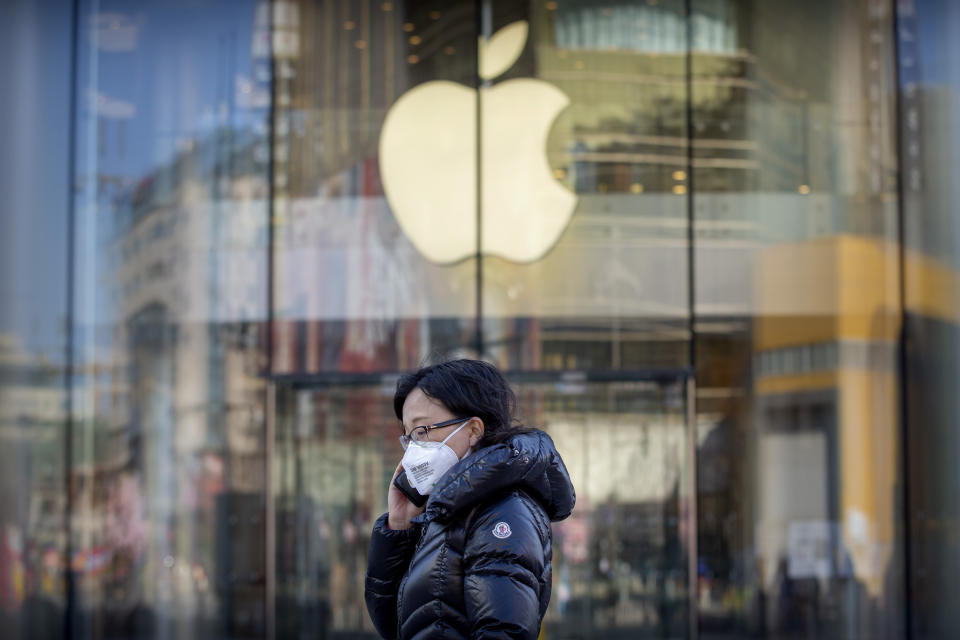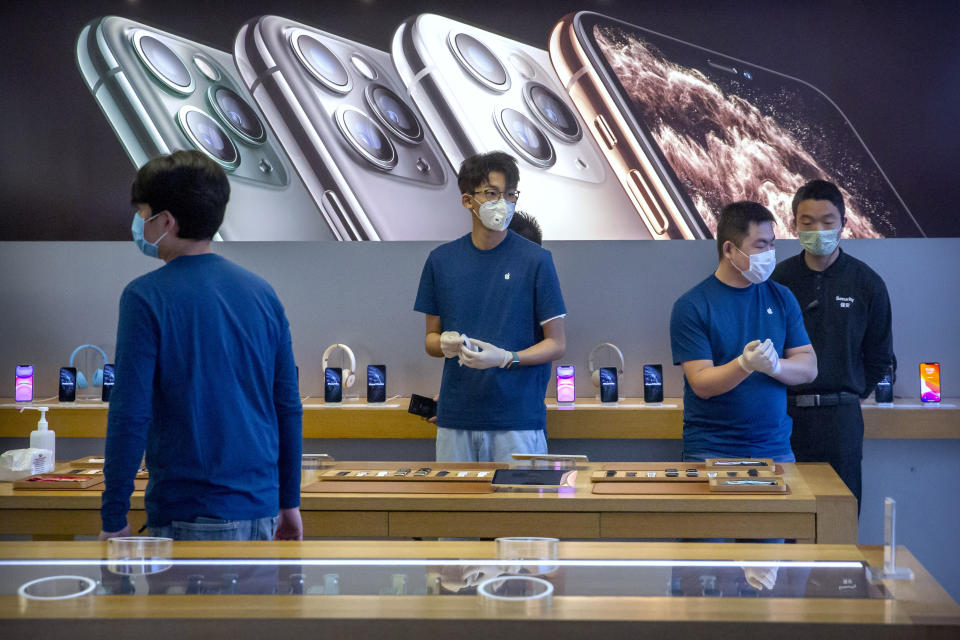Coronavirus could cost Apple billions in missed sales, analysts say
Apple may lose billions of dollars in sales because of the coronavirus outbreak in China, according to estimates from at least two industry analysts.
A mixture of slow sales in the country, coupled with a manufacturing slowdown due to the virus, could set Apple (AAPL) back between $4 billion and $7 billion in its upcoming quarter, the analysts say. The analysts' expectations follow a statement from Apple on Monday that it’s no longer on track to meet its prior revenue estimates of between $63 billion and $67 billion in the quarter.
To be sure, Apple may not be hurt in the long run because many consumers will simply hold off on buying new iPhones until they become available. Still, the revenue miss should also push Apple to rethink its dependence on China for the critical manufacturing needs, such as iPhone assembly, according to one expert.

"This is an additional reminder of why companies need to diversify away from China," says Joseph Foudy, an expert on global business and professor at NYU’s business school.
"[Companies have] already been looking at expanding elsewhere because of trade tensions, because of concerns about intellectual property, and this is yet another reason to sort of increase their presence in other countries in Southeast Asia or elsewhere to kind of reduce their risk."
Apple could take a hit worth billions
Apple is facing two problems in China as a result of the coronavirus: factory closures and a lack of consumers buying goods. Apple says its manufacturing partners, including Foxconn, have been unable to reach peak production capacity after the Chinese government forced them to sit idle in a bid to halt the spread of the coronavirus.
"While our iPhone manufacturing partner sites are located outside the Hubei province [the epicenter of the virus] — and while all of these facilities have reopened — they are ramping up more slowly than we had anticipated," the company said in a statement.
What's more, Apple's stores throughout China have been closed or operating with reduced hours, which is cutting into the company's sales for the quarter.
Piper Sandler's Michael Olson has cut his revenue expectations for Q2 2020 from $65.3 billion to $58.6 billion, citing a 20% miss on revenue from China, and a 10% miss on iPhone revenue outside of China.
Instinet's Jeffrey Kvaal, meanwhile, says that both iPhone and AirPods supplies are going to be hurt by the manufacturing disruption, potentially costing Apple as much as $4 billion in the quarter.

The coronavirus, however, isn't expected to impact Apple in the long term, and according to Kvaal, could lead to increased demand for the next-generation 5G iPhone that is expected to launch in September. It's unlikely users will end up ditching Apple entirely, as the company, like its competitors Samsung and Google, has done everything it can do to lock users into its ecosystem. As a result, those who can't purchase phones in the near term will likely end up purchasing Apple devices later, rather than jumping to another brand.
"We do not yet believe Apple’s iPhone 12 timelines are in jeopardy," Kvaal wrote in an analyst note following Apple's guidance revision. "Demand that slips into the iPhone 12 cycle may feed the ‘supercycle’ narrative that has fueled Apple’s shares of late."
Olson has a similar view on Apple's future, noting that Instinet is modeling 9% year-over-year iPhone growth as a result of the probable launch of the 5G phone coupled with pent up demand for the devices.
The supply chain issue
While the coronavirus' impact on Apple will likely be short lived, the long-term ramifications for China could cause companies including Apple's biggest supplier, Foxconn, to look elsewhere for their manufacturing needs.
"This is a continuation of what for a number of years has been called ABC, or Anywhere But China, companies trying to increase their operations outside of the country," Foudy said. "Now that's, in a sense, protection against tariffs and trade, and this is a reminder of it."
For Apple, manufacturing in China has helped it streamline its supply chain, but left it open to larger geopolitical tensions including the U.S.-China trade war.
To combat the impact of such roadblocks, Foudy said companies need to look to spread their supply chain to countries in Asia, Mexico, and even the U.S. During the peak of the U.S.-China trade war, manufacturers ranging from video game console makers to auto parts producers began moving their operations to other countries in Southeast Asia.
According to Foudy, while cheap wages used to be a main draw for manufacturers in China, that's no longer the case. Now cheaper labor can be found in places as close to the U.S. as Mexico.
"I think this is going to have an evolutionary impact, which is yet another reason why companies will slowly over time reduce their exposure to China," he said.
"I'm convinced that for most firms what that means is putting more of their future investment outside of China, rather than actually closing down factories. But it just adds another reason why companies will be leary of too much exposure to this market."
More from Dan:
Samsung’s foldable Galaxy Z Flip feels like the start of a revolution
Nvidia reports record data center revenue, but warns of coronavirus impact
Samsung's new Galaxy S20 brings 5G, major camera upgrades, and big prices
Got a tip? Email Daniel Howley at [email protected] or [email protected], and follow him on Twitter at @DanielHowley.
Follow Yahoo Finance on Twitter, Facebook, Instagram, Flipboard, SmartNews, LinkedIn, YouTube, and reddit.
